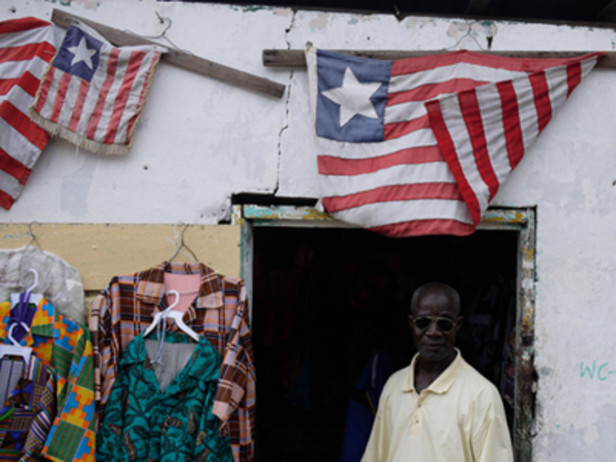NEWS
August 19, 2013

IN BRIEF
By: Blair Glencorse. This article was originally published by Devex. A decade ago, the Accra Comprehensive Peace Agreement ended 14 years of civil war in Liberia. Under President Ellen Johnson Sirleaf — the first female head of state in Africa and winner of the Nobel Peace Prize in 2011 — much progress has been made. Elections have been held, debt has been forgiven and economic growth has been impressive. The government has signed up to a host of international standards and best practices, related to everything from natural resources management to government transparency. Since 2003, the international community has poured [...]
SHARE
By: Blair Glencorse. This article was originally published by Devex.
A decade ago, the Accra Comprehensive Peace Agreement ended 14 years of civil war in Liberia.
Under President Ellen Johnson Sirleaf — the first female head of state in Africa and winner of the Nobel Peace Prize in 2011 — much progress has been made. Elections have been held, debt has been forgiven and economic growth has been impressive. The government has signed up to a host of international standards and best practices, related to everything from natural resources management to government transparency.
Since 2003, the international community has poured billions of dollars of aid into the country. In 2011 alone, OECD data indicates that Liberia received $765 million in official development assistance, 73 percent of its gross national income. Hundreds of international NGOs have set up offices and deployed staff to manage projects. The United Nations spends over $500 million a year on its peacekeeping force, which a decade after the peace agreement still totals 7,500 troops.
In spite of all this, Liberia is still one of the poorest countries on earth.
Over 50 percent of the population lives in extreme poverty on less than $0.50 a day, life expectancy is just 57 years, the population is one of the least skilled anywhere and illiteracy is over 60 percent. The U.N. ranks Liberia 182nd out of 187 countries on its Human Development Index, and Liberia was recently featured toward the bottom of Transparency International’s Global Corruption Barometer.
Aid dependency
How can we square the amount of attention, resources and effort put into rebuilding Liberia with these conditions on the ground? At its heart, this is an accountability problem through which the Liberian government has become oriented not toward its citizens, but toward a well-meaning, generous but ineffective international community. While there are many truly excellent development workers in Liberia, they are operating within an outdated aid system that breeds dependency, undermines capacity and ignores sustainability.
Well-qualified Liberians are drawn away from government or civil society positions by higher wages in donor organizations. Each of these entities has their own agenda, procedures, obligations, reporting methods, funding streams and target beneficiaries. The result in many cases is overlapping authorities, duplication of efforts and significant space for corruption.
There is no doubt that Liberia is an extremely difficult place to work, and there are certainly elements of the international system that are creating positive change. The Africa Governance Initiative, for example, is providing critical support and skills-transfer for government planning and implementation. Community-focused NGOs such as Last Mile Health are saving lives in very remote parts of the country, and a nascent technology community is emerging with the support of organizations like iLab Liberia.
Changes in approach
However, to give Liberia a better chance at overcoming its past and moving towards a more prosperous future, the international community must escape from its self-perpetuating cycle of underachievement.
This might involve three core changes in approach.
1. Accountability and transparency have to be at the center of all activities. The huge amount of money coming into the country leads to ample opportunities for graft within aid programs,as World Vision among many other organizations has discovered in the past. It is difficult to expect Liberian counterparts to adhere to strict standards of financial responsibility if donors do not do so themselves. At the Accountability Lab, we put all of our expenditures on our website in real time, so anyone anywhere can always see exactly what we’re spending — so why can’t other NGOs and donors do the same?
2. More honesty and creativity are required in delivery. Expensive project launch events and photos of smiling children are excellent public relations exercises, but they are not reducing poverty or corruption. Equally, it does not take long to discover that most Liberians are either tired of or uninterested in donor workshops, trainings and conferences — especially if they do not include a free lunch. This means we must bolster programs that use engaging, context-specific ways to bring citizens into the development process through education, culture, religion and the media.
3. There must be a very clear emphasis on sustainability. The aid system has become a competitive struggle between NGOs for donor contracts, which means development is supply-driven and generally based on 1-3 year funding cycles. As a result, there is often a rush to show short-term results, collaboration between organizations is rare and staff turnover is high. This means changing incentives and benchmarks to reward cooperation, and moving away from government aid towards long-term change through alternative approaches such as social enterprise and efforts to boost domestic philanthrophy.
In Liberia, an externally-facing government has become accountable to taxpayers in the West rather than to its own people. Impressive progress has been made in the last ten years, but largely despite — rather than because of — international aid organizations.
(Top photo by Ken Harper / CC BY-NC)
